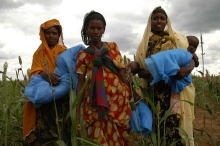These African women are holding bed nets, which will help protect their families from mosquitoes carrying malaria. Photo: Gates Foundation
The association, which was formed in June 2012 as the first continent-wide professional association of health journalists, hopes to use the site to advance the professional development of journalists who cover health, raise the profile of health stories in the media and promote dialogue and understanding between journalists and experts. All this, it believes, can have a direct effect on the health of Africans.
“We want to see improvement in health infrastructure and systems, such as through improved maternal and child health and decreased mortality rates,” said Declan Okpalaeke, a Nigerian journalist who is leading the association as part of his ICFJ Knight International Journalism Fellowship. “We want to see the media setting the agenda for policy makers, for health systems and for health institutions.”
Read more about the new site on IJNet.
The International Journalists' Network, IJNet, keeps professional and citizen journalists up to date on the latest media innovations, online journalism resources, training opportunities and expert advice. ICFJ produces IJNet in seven languages: Arabic, Chinese, English, Persian, Portuguese, Russian and Spanish. IJNet is supported by donors including the John S. and James L. Knight Foundation.